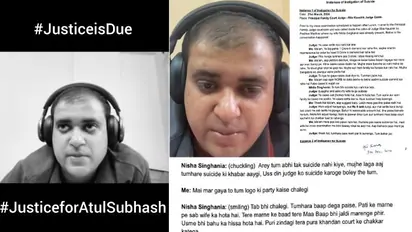Atul Subhash suicide case has driven focus on men’s mental health. Why ‘Man up’ is not the answer

Synopsis
Surveys from around the world find that males everywhere are reluctant to talk about their mental health and are more likely to die by suicide than females.
The tragic suicide of Atul Subhash, a 34-year-old techie in Bengaluru, has triggered a nationwide debate on marital discord, the misuse of dowry prohibition laws and also men's mental health. Before he died by suicide, Atul Subhash recorded an 80-minute video in which he accused his estranged wife Nikita Singhania and her family of slapping multiple cases on him and his family to extort money from them. Atul Subhash also criticised the justice system in his 24-page suicide note.
#MenToo started trending on social media platform X a day after Subhash died by hanging himself from the ceiling at his residence in Bengaluru. Hundreds of netizens posted on X with #MenToo and #JusticeForAtulSubhash hashtags while seeking justice for Subhash.
A user wrote, "It’s a crime to be a man in India."
The disturbing case has yet again reignited conversations around men’s mental health, particularly in the context of failed marriages and the burden of financial exploitation.
Men’s mental health: ‘Man up’ is not the answer
Surveys from around the world find that males everywhere are reluctant to talk about their mental health and are more likely to die by suicide than females. Studies suggest men are far less likely than women to access mental health resources, a trend exacerbated by societal pressures to “man up” and endure hardships without complaint.
Subhash in his last video voiced concerns about being harassed, exploited, forced to pay exorbitant sums that left him financially and emotionally drained.
The legal battles over alimony often take years, during which men may face societal judgment, isolation, and mounting debts. For many, the inability to see a way out of these predicaments results in overwhelming despair, leading to tragic outcomes.
The phrase “man up” epitomizes the toxic masculinity that compels men to endure their struggles in silence. It invalidates their pain and reinforces the notion that seeking help is a sign of weakness. Subhash’s story underscores the lapse and his lack of faith in judiciary.
Even in his suicide notes, he wrote that — 'if I win from the system, devote my mortal remains in Ganga otherwise in a gutter outside the court.'
Moving towards Solutions
- Mental Health Support: Accessible and affordable mental health resources tailored specifically for men must become a priority. Encouraging open dialogue about mental health can help dismantle the stigma surrounding it.
- Legal Reforms: Alimony laws should be revisited to ensure fairness and prevent misuse. Transparency and balanced approaches are key to addressing the concerns raised by men in similar situations.
- Awareness Campaigns: Initiatives aimed at educating society about the pressures men face can help shift perceptions and foster empathy.
Stay updated with the Breaking News Today and Latest News from across India and around the world. Get real-time updates, in-depth analysis, and comprehensive coverage of India News, World News, Indian Defence News, Kerala News, and Karnataka News. From politics to current affairs, follow every major story as it unfolds. Get real-time updates from IMD on major cities weather forecasts, including Rain alerts, Cyclone warnings, and temperature trends. Download the Asianet News Official App from the Android Play Store and iPhone App Store for accurate and timely news updates anytime, anywhere.